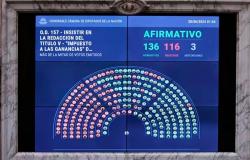The Fifth Chamber of the Civil and Commercial Appeals Chamber rejected the appeal filed by a banking entity against the sentence that condemned it to immediately cancel the “salary advance” service from a man’s account and also pay him one hundred thousand pesos in moral damages and another five hundred thousand more in punitive damages.
The 70-year-old man went in 2012 to open an account at the entity to receive his retirement benefits there. When the first salary was credited in the amount of 56,395.49 pesos, the man withdrew 50 thousand, leaving a balance of 6,395.49 pesos in the account.
The next day the retiree asked his son to withdraw the balance. He had the sum of 14 thousand pesos available.
The retiree later went to the bank where they told him that it was a cash advance, a service that was included in the contracted account. He then requested discharge from service since he had not requested it. The man was referred to the manager who informed him of extractions that he never performed. When checking the balance corresponding to the following month, he only had 17,500 pesos available.
Due to his age, man is classified as a hypervulnerable consumer.
In the case, the bank did not prove that it had informed the consumer in a “clear, certain and detailed manner that the advance service” was included in the account, nor that when making a claim, the bank had provided “a due explanation.” and a consequent solution.”
Judge Soledad Fiorillo and Judge Alfredo Gómez Bello pointed out that “the pure inequality of knowledge between two potential contractors acquires special relevance in those cases in which there is the impossibility or great difficulty of obtaining the precise information on one’s own. In these cases, good faith imposes on the other businessman the duty to communicate the data relevant to the contract and of which he had or should have knowledge.
The fact that the man had signed the contract “does not prevent the configuration of a case of non-compliance with the duty of information established in article 4 of law 24240, since this does not account for the quality of information that was provided to him, especially when The law does not impose any duty of information, but rather it must be qualified, true, effective and sufficient.”
The supplier – the judges said – “bears the duty of duly communicating the relevant data of which the consumer should be aware, at all stages of the relationship.”
They pointed out that “there is no doubt that the Bank should have proven that it had duly explained to Mr. P., at the time of signing the application, that the ‘advance’ service was included in that contract and that his signature would imply its acceptance. Likewise, he had to prove that – at the time of making successive complaints to the bank – the cause of the problem was duly informed and a timely and effective solution was provided.”
It is the provider who has at its disposal the means to inform and explain the conditions of the system of which it is a part. None of these issues were proven by the defendant throughout the process, the judges pointed out.
They considered that the absence – on the part of the Bank – of due information at the time of signing the request for registration of an account – regarding the scope of what was contracted – as well as the lack of information and, above all, of a solution to the problem raised subsequently generated a long pilgrimage – undoubtedly had an impact on the actor’s feelings, generating an injury to his spiritual sphere that surpasses what jurisprudence commonly calls “sufferings typical of life in society.”
The entity argued that it had not breached the duty of information, which the judges considered insufficient to sustain the appeal filed.
“The request to reduce the amount is not sufficient either,” they pointed out. The bank must also pay the costs of the trial.
The Fifth Chamber of the Civil and Commercial Appeals Chamber rejected the appeal filed by a banking entity against the sentence that condemned it to immediately cancel the “salary advance” service from a man’s account and also pay him one hundred thousand pesos in moral damages and another five hundred thousand more in punitive damages.
The 70-year-old man went in 2012 to open an account at the entity to receive his retirement benefits there. When the first salary was credited in the amount of 56,395.49 pesos, the man withdrew 50 thousand, leaving a balance of 6,395.49 pesos in the account.
The next day the retiree asked his son to withdraw the balance. He had the sum of 14 thousand pesos available.
The retiree later went to the bank where they told him that it was a cash advance, a service that was included in the contracted account. He then requested discharge from service since he had not requested it. The man was referred to the manager who informed him of extractions that he never performed. When checking the balance corresponding to the following month, he only had 17,500 pesos available.
Due to his age, man is classified as a hypervulnerable consumer.
In the case, the bank did not prove that it had informed the consumer in a “clear, certain and detailed manner that the advance service” was included in the account, nor that when making a claim, the bank had provided “a due explanation.” and a consequent solution.”
Judge Soledad Fiorillo and Judge Alfredo Gómez Bello pointed out that “the pure inequality of knowledge between two potential contractors acquires special relevance in those cases in which there is the impossibility or great difficulty of obtaining the precise information on one’s own. In these cases, good faith imposes on the other businessman the duty to communicate the data relevant to the contract and of which he had or should have knowledge.
The fact that the man had signed the contract “does not prevent the configuration of a case of non-compliance with the duty of information established in article 4 of law 24240, since this does not account for the quality of information that was provided to him, especially when The law does not impose any duty of information, but rather it must be qualified, true, effective and sufficient.”
The supplier – the judges said – “bears the duty of duly communicating the relevant data of which the consumer should be aware, at all stages of the relationship.”
They pointed out that “there is no doubt that the Bank should have proven that it had duly explained to Mr. P., at the time of signing the application, that the ‘advance’ service was included in that contract and that his signature would imply its acceptance. Likewise, he had to prove that – at the time of making successive complaints to the bank – the cause of the problem was duly informed and a timely and effective solution was provided.”
It is the provider who has at its disposal the means to inform and explain the conditions of the system of which it is a part. None of these issues were proven by the defendant throughout the process, the judges pointed out.
They considered that the absence – on the part of the Bank – of due information at the time of signing the request for registration of an account – regarding the scope of what was contracted – as well as the lack of information and, above all, of a solution to the problem raised subsequently generated a long pilgrimage – undoubtedly had an impact on the actor’s feelings, generating an injury to his spiritual sphere that surpasses what jurisprudence commonly calls “sufferings typical of life in society.”
The entity argued that it had not breached the duty of information, which the judges considered insufficient to sustain the appeal filed.
“The request to reduce the amount is not sufficient either,” they pointed out. The bank must also pay the costs of the trial.
#Argentina






